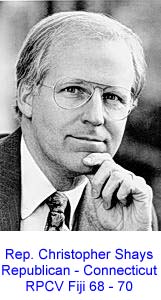
Chris Shays says U.S. made mistakes in Iraq
Shays -- U.S. made mistakes
By JILL BODACH
Hour Staff Writer
The United States made several significant mistakes during the course of Operation Iraqi Freedom, according to U.S. Rep. Christopher Shays, R-4th District.
During a media briefing Monday morning, Shays outlined six errors made by the Bush administration, all of which are linked by the common thread of an underestimation by the United States of the Iraqi people's ability to govern their own country.
After visiting Iraq five times since the start of the war, Shays said that he has seen a trend in the progress made in Iraq, but that he has also observed the lack of progress in several significant areas.
One of the biggest mistakes, according to Shays, was to disband the Iraqi government, military and police.
"Most of the Iraqi people I have spoken to believe that the majority of the police, army and government are good people and that it would have been possible to root out the 'bad guys' without firing everyone," Shays said. "By making this mistake, we left a void, which was filled by people like Moqtada al-Sadr, with whom we should have dealt sooner, when he had a force of hundreds rather than thousands. Now our troops are overworked because we are asking them to do more than they should be doing." A lack of understanding of the Iraqi culture also lead to a feeling of distrust by the Iraqi people, Shays said.
"We did not engage Arabic speakers and Iraqi-Americans soon enough," Shays said. "Consequently, we had little knowledge of how Iraqis would react to the occupation of their country." The United States also didn't know show an understanding for the assets of the Iraqi people by not protecting them, Shays said.
"While we intuitively knew it was a serious mistake to not protect Iraqi assets, it was a greater mistake than we realized, both culturally and militarily," Shays said.
Also contributing to that distrust was and a lack of effort in assisting the Iraqis in understanding American culture.
"We must redouble our efforts to help Iraqis understand the people of the United States and our intentions," Shays said. "The United States waited too long to undertake an effective effort to broadcast the truth to the Iraqi people. We must work overtime to win the hearts and minds of the Iraqi people because the Al Jazeera news network is influential." The United States also faltered in its underestimation of the power of the weapons available to the Iraqi people.
"We made a serious mistake by not gaining control of munitions depots and weapons caches Saddam Hussein pre-deployed throughout Iraq because almost anyone can access these weapons supplies and use them against Coalition forces," Shays said. "We also didn't understand how financially lucrative the development of improvised explosive devices is in Iraq. Bomb-making is how some of them make their living and they are very proficient at it. We must crack down on delivery routes for these items and increasing the staff of the investigation unit from nine to 100 is a way to do that." In addition to the mistakes he observed, Shays has made recommendations to increase the productivity in Iraq, including a transfer of power.
"While we will have a presence in Iraq for years to come, the transfer of power must happen as soon as possible," he said. "It will be difficult, whether it happens in two months or two years. We should acknowledge that the transition is never going to be easy or neat, but it has to be done." Despite the mistakes Shays has seen that constituents in the 4th District seem to support the efforts in Iraq, according to the results of his recent 2004 Legislative Questionnaire.
ä Eighty percent of the 24,551 people who responded to the survey believe that the United States might fight the war on terrorism at home and abroad.
ä Fifty-four percent support a pre-emptive military strike by the United States in the area of the world known to harbor terrorists.
ä Seventy-five said they would have voted to support the use of force in Afghanistan and 53 percent said they would have voted to support the use of force in Iraq
